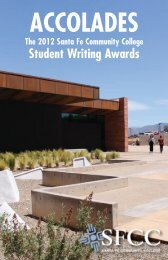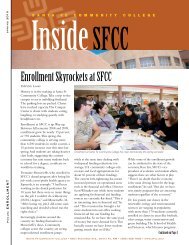2011 Student Writing Awards Booklet - Santa Fe Community College
2011 Student Writing Awards Booklet - Santa Fe Community College
2011 Student Writing Awards Booklet - Santa Fe Community College
You also want an ePaper? Increase the reach of your titles
YUMPU automatically turns print PDFs into web optimized ePapers that Google loves.
Academic Essay<br />
Honorable Mention<br />
Eric Reinach<br />
Elements of the Iconic in Bicycle Thieves<br />
While I watchVittoria DeSica’s Bicycle Thieves a pronounced déjà vu<br />
occurs, the images and expressions are so archetypal that I feel a pull, a definite<br />
sense of having seen the faces and scenes before. In writing this essay I<br />
hope to identify some of the reasons for this sensation, and address why a<br />
film deeply rooted in a specific setting (Rome, Italy, 1948) manages to transcend<br />
that time and place to speak so profoundly to a modern audience.<br />
As discussed in our class lecture, Italian Neo-Realism was the<br />
product of the nine years immediately following the Second World War.<br />
DeSica’s direction, out of both aim and necessity, brought together many<br />
issues of the Italian political and social climate at the time. After the War<br />
social concerns remained turbulent, the wake of Fascist rule and the rise of<br />
Stalinist Russian loomed over an uncertain future. Similar issues being<br />
faced all over Europe and the Western world comes as perhaps the first reason<br />
the movie was so well received from its debut, not simply in Italy but<br />
by Hollywood as well.<br />
The elevation of the stakes from the very beginning is a more personal<br />
reason I find the film compelling. Bicycle Thieves invokes a sense of<br />
the dire economic situation at once and centers the action around this<br />
simple theme for the rest of the action. We see this expressly when the<br />
film opens with our first in a series of recurring shots of crowds, this time<br />
located at an employment office in a town outside Rome. Through the<br />
mass of men we see the ‘hero’ character emerge, a lean faced family man<br />
who lucks into a job when so many obviously have no work. And here<br />
we discover another central theme – the necessity of having a bike. From<br />
the very start the boss makes clear to our protagonist that he must possess a<br />
working bicycle, the man’s initial excuse that his ‘bike needs to be fixed’ (a<br />
lie) doesn’t stand up. The director informs us with the small, white lie that<br />
the protagonist is distinctly human, a flawed man trying to do his best for<br />
his family. So the audience knows from those first few scenes of the film<br />
what will be pivotal throughout; a man, a job, and a bike.<br />
At this point I begin to wonder about the potential for our hero<br />
to steal a bicycle; an idea I believe DeSica purposely introduces and maintains<br />
as the narrative develops. The empathy of the audience is a tool that<br />
60

















